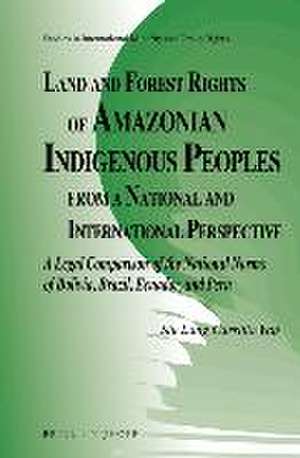Land and Forest Rights of Amazonian Indigenous Peoples from a National and International Perspective: A Legal Comparison of the National Norms of Bolivia, Brazil, Ecuador, and Peru: Studies in International Minority and Group Rights, cartea 16
Autor Siu Lang Carrillo Yapen Limba Engleză Hardback – 21 feb 2022
Through bringing together international law with national law, natural resources law with property law and law with natural sciences, the author sheds new light on the complex topic of indigenous peoples’ rights closely entwined with the conservation of the Amazonian rainforest.
Preț: 916.92 lei
Preț vechi: 1118.20 lei
-18% Nou
Puncte Express: 1375
Preț estimativ în valută:
175.46€ • 183.65$ • 146.03£
175.46€ • 183.65$ • 146.03£
Carte indisponibilă temporar
Doresc să fiu notificat când acest titlu va fi disponibil:
Se trimite...
Preluare comenzi: 021 569.72.76
Specificații
ISBN-13: 9789004439382
ISBN-10: 9004439382
Dimensiuni: 155 x 235 mm
Greutate: 0 kg
Editura: Brill
Colecția Brill | Nijhoff
Seria Studies in International Minority and Group Rights
ISBN-10: 9004439382
Dimensiuni: 155 x 235 mm
Greutate: 0 kg
Editura: Brill
Colecția Brill | Nijhoff
Seria Studies in International Minority and Group Rights
Cuprins
Acknowledgements
German and Spanish Summaries (Zusammenfassung/Resumen)
List of Tables and Graphics
List of Abbreviations and Acronyms
1 Introduction: Conflicts Because of Lands and Forests – the Challenging Relation between Amazonian Indigenous Peoples and Their Nation States
1.1 Structure of the Book
1.2 Method
2 Setting the Scene
2.1 The Amazonian Region as a Geographical Place
2.2 Amazonian Indigenous Peoples
2.3 Community Forest Management as a Form of Use of Forest Resources
3 Establishing the Legal Standards: Rights of Indigenous Peoples at the International Level
3.1 Development of Indigenous Rights in International Law
3.2 Rights of Indigenous Peoples at the International Level
3.3 Binding Character of International Agreements Referred to Indigenous Peoples (ILO Convention 169, UNDRIP and Biodiversity Convention)
3.4 Conclusions
4 Relationship between the Nation States and Indigenous Peoples
4.1 Historical Appraisal of Citizenship Regimes: Citizens, Non-citizens and People under Guardianship Regime
4.2 Indigenous Peoples in the Current Legal Systems
4.3 Conclusions of the Chapter
5 Rights of Amazonian Indigenous Peoples to the Lands and Territories
5.1 Historical Appraisal: The Long Road for Amazonian Indigenous Peoples to Recover Their Rights over Lands and Territories
5.2 Rights to the Lands in the Current Constitutions and National Laws
5.3 Conclusions of the Chapter
6 Rights of Indigenous Peoples to the Forest Resources
6.1 Historical Appraisal of the Forest Rights of Indigenous Peoples
6.2 Key Features of the Forest Norms
6.3 Rights over Forest Resources
6.4 Conclusions of the Chapter
7 Community Forest Management (CFM)
7.1 Definition of Community Forest Management
7.2 CFM and Traditional Forest-Related Knowledge
7.3 CFM before the Enactment of the Current Norms
7.4 Current Regulation of CFM
7.5 Conclusions of the Chapter
8 Evaluation and Summary
8.1 Implementing International Law in the National Legal Systems of Bolivia, Brazil, Ecuador and Peru
8.2 Strengthening the Lands and Forests Rights of Amazonian Indigenous Peoples for the Conservation of the Amazon Rainforest
References
Index
German and Spanish Summaries (Zusammenfassung/Resumen)
List of Tables and Graphics
List of Abbreviations and Acronyms
1 Introduction: Conflicts Because of Lands and Forests – the Challenging Relation between Amazonian Indigenous Peoples and Their Nation States
1.1 Structure of the Book
1.2 Method
2 Setting the Scene
2.1 The Amazonian Region as a Geographical Place
2.2 Amazonian Indigenous Peoples
2.3 Community Forest Management as a Form of Use of Forest Resources
3 Establishing the Legal Standards: Rights of Indigenous Peoples at the International Level
3.1 Development of Indigenous Rights in International Law
3.2 Rights of Indigenous Peoples at the International Level
3.3 Binding Character of International Agreements Referred to Indigenous Peoples (ILO Convention 169, UNDRIP and Biodiversity Convention)
3.4 Conclusions
4 Relationship between the Nation States and Indigenous Peoples
4.1 Historical Appraisal of Citizenship Regimes: Citizens, Non-citizens and People under Guardianship Regime
4.2 Indigenous Peoples in the Current Legal Systems
4.3 Conclusions of the Chapter
5 Rights of Amazonian Indigenous Peoples to the Lands and Territories
5.1 Historical Appraisal: The Long Road for Amazonian Indigenous Peoples to Recover Their Rights over Lands and Territories
5.2 Rights to the Lands in the Current Constitutions and National Laws
5.3 Conclusions of the Chapter
6 Rights of Indigenous Peoples to the Forest Resources
6.1 Historical Appraisal of the Forest Rights of Indigenous Peoples
6.2 Key Features of the Forest Norms
6.3 Rights over Forest Resources
6.4 Conclusions of the Chapter
7 Community Forest Management (CFM)
7.1 Definition of Community Forest Management
7.2 CFM and Traditional Forest-Related Knowledge
7.3 CFM before the Enactment of the Current Norms
7.4 Current Regulation of CFM
7.5 Conclusions of the Chapter
8 Evaluation and Summary
8.1 Implementing International Law in the National Legal Systems of Bolivia, Brazil, Ecuador and Peru
8.2 Strengthening the Lands and Forests Rights of Amazonian Indigenous Peoples for the Conservation of the Amazon Rainforest
References
Index
Notă biografică
Dr. jur. Siu Lang Carrillo Yap (2020), Georg August University of Göttingen, is a lawyer with an interdisciplinary background and several years of work experience in Amazonia. Currently, she is head of a program for strengthening indigenous autonomies in Peru.











